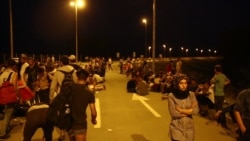"Thank you, Serbia," an excited woman in a hijab said, smiling broadly at a Serbian police officer giving directions to migrants in Bezdan.
This small Serbian village was the new stop Thursday for a steady stream of migrants who were unable to enter Hungary through Horgos.
On Wednesday afternoon, Hungarian police had clashed with migrants gathered at the border there and used tear gas and batons to disperse crowds trying to break in.
Serbia arranged buses Thursday to transfer people from there to a village at the border with Croatia.
In Bezdan, the mood was different. Migrants climbing from the buses and taxis were greeted by Serbian Red Cross representatives handing out food and water. Medics stood by to help anyone who needed treatment. A few children washed their heads under a water tanker.
The relief was evident in many smiles and relaxed expressions. A family with a week-old baby, born in Greece, posed for a photo.
Until a day ago, many had been stuck at the border with Hungary, not knowing what to do. They felt they now had a way forward.
Crowd builds at Croatian border
One kilometer away, at the Croatian border, crowds swelled as Croatian authorities struggled to cope with the arrivals. One of the two camps set up for the migrants 30 kilometers inside Croatia was already full by Thursday evening. The other was filling up quickly. And the stream of migrants continued.
Migrants had to wait for buses for hours at the border, which had been closed for normal traffic. The head of Croatian police at the scene looked tired as he sat with his back to a lamppost. He had been up since 5 a.m.
Croatian authorities said migrants entering their country would have to register according to European Union law. Those migrants wanting to move to Western European countries like Germany and Sweden seemed unhappy with the idea. They were afraid of being sent to a camp or getting stuck in Croatia.
Still, the mood in general was upbeat, compared with what VOA journalists witnessed in Röszke and Horgos over the last few days. Police were trying to be helpful and giving directions. Migrants who spoke English were acting as interpreters for others.
As evening fell, people settled onto the road. One man started singing spontaneously. Others gathered around him, clapping. They seemed willing to wait patiently, as long as it meant a safe entry into Europe and their new lives.
WATCH: Ayesha Tanzeem reports from the Croatian border






